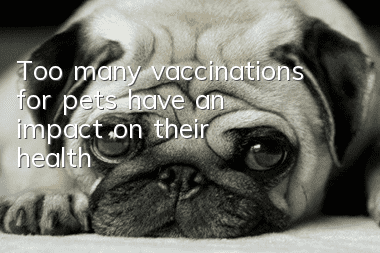Too many vaccinations for pets have an impact on their health!

Pet vaccination once a year seems to have become the domestic practice of vaccination frequency. But have you ever questioned such frequent vaccinations? You must know that most of us humans only receive various vaccinations at birth, and then all vaccinations will stop. Pets require a large number of vaccinations every year. This is really Is it reasonable? In fact, the effective period of the vaccine is much longer than one year.
Human vaccine injection cycle
In addition, parents who have kept pets for many years should also have discovered that no matter how old or how heavy your dog/cat is, the amount of vaccine injection is the same and has not been adjusted. In other words, the injection dose for a 3 or 4-pound Teddy is the same as that for a 100-pound Alaska.
Why is it recommended that you reduce the frequency of vaccinations?
According to a study by British experts, 10% of 2,000 cats and dogs injected with vaccines will have adverse reactions (the vaccine manufacturer claims that the negative reactions are only 0.015%), especially those with smaller bodies are ten times more likely to occur than those with larger bodies. times, enough to prove that the standard vaccine dose is seriously excessive for small cats and dogs.
The adverse reactions caused by this overdose of vaccine range from loss of appetite, sneezing, and local swelling at the vaccination site to severe cases such as persistent vomiting, diarrhea, skin itching, and even difficulty breathing, and even worse cases to death. To say the least, even without these adverse reactions, multiple vaccinations can overwhelm their immune systems.
The origin is still the requirement of "annual vaccination", so where does the basis come from? Dr. W. Jean Dodds, Chairman of the Public Welfare Animal Red Cross (one of the pioneers in the debate on vaccines) once Put it this way, "As the issue of vaccines arose, they began to study how the annual vaccination requirement came about. After years of research, they found that the USDA and drug manufacturers issued this "recommendation" more than 20 years ago and that it had no scientific basis. According to."
In other words, the veterinary community has been insisting on vaccinating pets every year for many years. Is it just because of inertia? Manufacturers even print annual vaccinations on the medicine bottles, which has led to new doubts and protests but is opposed. This is a shameful operation. ....
In fact, before Dr. W. Jean Dodds made this statement, the University of Pennsylvania in the United States was the first to discover this in 1991. They found from many cases that rabies vaccine injection caused a malignant inflammatory reaction in subcutaneous tissue and could induce feline sarcoma cancer. At the same time, the University of California, Davis also confirmed this and found that the feline leukemia vaccine can induce feline sarcoma cancer to a greater extent than the rabies vaccine.
This discovery led veterinarians to re-examine the issue of injection cycles and found that long-term repeated injections of vaccines in cats will lead to a 1/1000 chance of sarcoma cancer, according to the United States., with 22,000 cases occurring every year. Other vaccine reactions were also discovered one after another, such as endocrine diseases, allergies, arthritis, tumors, epilepsy, etc. It was not until 1995 that the American Veterinary Medical Journal finally stated that "there is almost no scientific evidence for the "annual injection required" marked on the vaccine bottle. Support it." The final word was given.
Note: American feline practitioners have made several suggestions for reducing the risk of related tumors in published cat vaccine guidelines;
1. Only inject when the risk of infection is high, but the more injections, the greater the risk of tumors;
2. Reduce the frequency of injections, such as feline distemper, feline herpes virus and feline calicivirus, to no more than once every 3 years;
3. Change intramuscular injection to subcutaneous injection to detect tumor problems as early as possible;
4. Change the injection area to the ends of the limbs to prevent the spread of tumors (amputation is possible);
Excerpted from Jenette Restivo, ABCNews.com
About the vaccine itself
This topic is a cliché. The most important thing for us is to understand what exactly a vaccine is? What role does it play? In a vaccine, pathogenic microorganisms and their metabolites are artificially made into immune preparations that can prevent infectious diseases, just like Be prepared in advance. When someone sneaks up on you, your shadow guard will be defeated before you can react.
Vaccines are mainly divided into weak live vaccines (low toxicity) - Intevi and inactivated vaccines - Miao Sanduo. The weakly live vaccine contains weak toxicity, which can allow cats and dogs to produce antibodies without being infected. The most common ones are the five-part vaccine for dogs and the three-part vaccine for cats; the inactivated vaccine, as the name suggests, kills all the viruses, and there is no chance of infection. , the most common ones are rabies vaccine, influenza vaccine, etc.
Although judging from the name, inactivated vaccines seem to be safer. But in fact, from the perspective of immune effect and long-term health, attenuated live vaccines are better than inactivated vaccines. However, for cats and dogs who are already in the disease stage or are weak, the risk is higher and will only aggravate the condition. This is also Reasons why veterinarians give them physical exams before giving them vaccinations.
I would like to remind everyone not to inject the vaccine yourself. Because domestic vaccine smuggling is very serious, if it is not stored well, it will easily lose its effectiveness and will be useless to cats and dogs. Regardless of whether the vaccine is injected in a hospital or a pet shop, it is best to have the doctor test the effectiveness with a cat distemper test paper in person before the injection. If it is positive, it is valid.
According to the latest revised American Animal Hospital Association canine vaccine guidelines in 2018 and the content published by the Canadian Veterinary Medical Association, core vaccines must be injected.
Note:For the rabies vaccine, please refer to Dr. Lisa A Pierson’s opinion. If the cat is kept at home and does not go out, and is not in an epidemic area, there is no need to inject rabies vaccine.
For example, feline leukemia vaccine, feline intraperitoneal vaccine, feline AIDS vaccine; dog kennel cough, canine Lyme disease, canine leptospirosis, etc. are all non-core vaccines. If there are no special needs (potential risks or genetic diseases, etc.) ), injections are not recommended for healthy cats. These diseases, whether through vaccination or natural infection, cannot produce strong enough immunity. It is worth mentioning the feline herpes virus. If a kitten is infected with this disease in childhood, it will carry this virus for years or even a lifetime. Repeated vaccinations are an exercise in futility. In addition, the same applies to feline leukemia. After vaccination in the first year and booster in the following year, injections are no longer needed for life.
As for canine Lyme disease and Leptospira canis, if your dog often goes to the wild or lives in an area where these diseases are endemic, the benefits of vaccination still outweigh the risks.
Vaccine injection process recommendations from authoritative experts
There is currently a lot of controversy over whether cats need to be vaccinated against rabies and how often they should be vaccinated. So taking cat vaccination as an example, three different injection plans are provided below, each from:
Dr. Jean Dodds, founder of the Public Welfare Animal Blood Bank, director of the Blood Research Laboratory at the Wadsworth Research Center, and executive director of the New York State Human Blood Transfusion Council;
Dr. Ronald D. Schultz is an expert on the American Animal Hospital Association (AAHA) Canine Vaccine Task Force and the American Association of Feline Veterinary Practitioners (AAFP) Cat Vaccine Task Force and one of the most authoritative figures in animal immunology;
AAFP, the American Association of Feline Veterinary Practitioners, is a professional organization composed of veterinarians (founded in 1971, dedicated to improving the quality of life of feline pets and promoting related medical advances);
Again, the above vaccines are only for domestic cats. If they do not go out and are not in an epidemic area, there is no need for rabies vaccination. As for the vaccination of stray cats, it is best to inject one core vaccine after short-term observation and isolation to determine that there are no health risks.
If you find that you are still sick despite being vaccinated, it is usually a "technical failure". For example, the age for the first immunization is too young, there is an infection before the injection (or infection immediately after the injection), and the vaccine will not protect you immediately after the injection. It has a certain onset of effect), the pet is in an unhealthy or malnourished state when the vaccine is injected, and it is caused by problems with congenital immune system defects. In many of these cases, it is not the vaccine that has failed, but the vaccine itself (weakened live vaccine) that caused the disease or the critical 16-18 weeks of vaccination was missed during the initial immunization.
Since we have talked about the vaccination of stray dogs above, let’s continue to talk about how pets with some special circumstances should be vaccinated.
For pets that are taking anti-cancer and chronic inflammatory hormone drugs (such as prednisolone) or immune system suppressive drugs (such as cyclosporine and cyclosporine), these drugs will change the results of the body's exposure to the drugs, thereby affecting immunity. System impacts. If the injected vaccine is a weak live vaccine, it will not only be ineffective, but may also cause infection, so vaccination is not recommended.
For pets with immune system diseases or chronic diseases (such as cancer, diabetes, kidney disease, cardiopulmonary disease, etc.), the immune systems of these pets are not as strong as before they were infected. They may need a "booster" shot, but these boosters There is no data yet on whether the shot can help them better resist infection, and we don't know yet. However, if you want to get vaccinated, it is recommended to choose the "inactivated vaccine". The weak live vaccine may only aggravate the condition.
For elderly pets, because the resistance weakens with age, even if the "booster shot" is re-inoculated, its intensity may be greatly reduced. The comparative immune effect is linked to the strength of the fish's own immune system. If you think you should take it, then for the same reason as the previous one, give priority to injecting inactivated vaccines.
Things more important than vaccination
Conducting annual physical examinations to understand pet parasites, tumors and overall health problems does not mean that everyone should not get vaccinated, but encourages everyone to check more to see if their babies need multiple injections. If there is no way to determine whether antibodies are still present in the cat or dog's body, a serum test can be done, which can be determined with a single blood draw. The effective protection period of the vaccine is close to 7 years. If indoor cats neither go out nor contact other animals, it is recommended not to inject too much. Dr. Becker believes that excessive vaccination is directly related to the deteriorating health status of cats.
Try not to go to pet hospitals/pet shops with high traffic volume, or areas where pets are infected. If you come into contact with other animals, as a precaution, change your clothes and wash your hands as soon as possible after returning home, especially after contact with stray cats and dogs. , because they are outdoors, there may be a large number of bacteria, germs, etc. on them.
Finally, I would like to remind everyone that if your cat or dog has had a severe, life-threatening vaccine reaction, please do not get vaccinated again! Article source: Pet Everything House
- How to prevent parasites in pet dogs
- What to do if your dog is constipated
- What skin diseases are Border Collies more likely to get? How to prevent them?
- Are dogs born with the ability to swim?
- What is the difference between Japanese Shiba Inu and Akita Inu? How to distinguish between Shiba Inu and Akita Inu?
- Are e-cigarettes harmful to pets? Chewing on e-cigarettes or cigarette bottles may lead to the death of cats and dogs
- How to train a Gordon Setter to be obedient
- Dog food taboos
- Which pet trading platform is better? Recommended pet trading platform!
- Why can’t dogs open their eyes?



